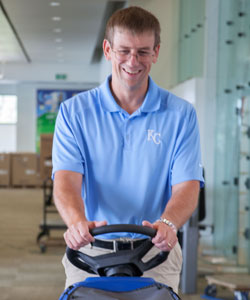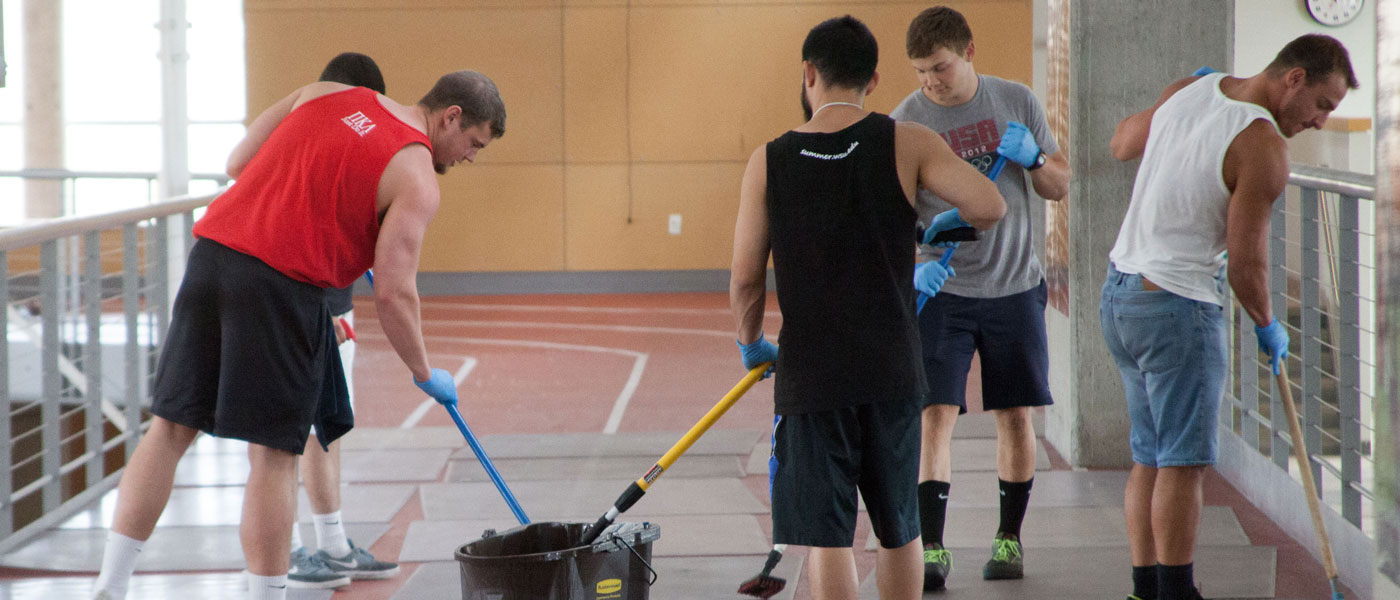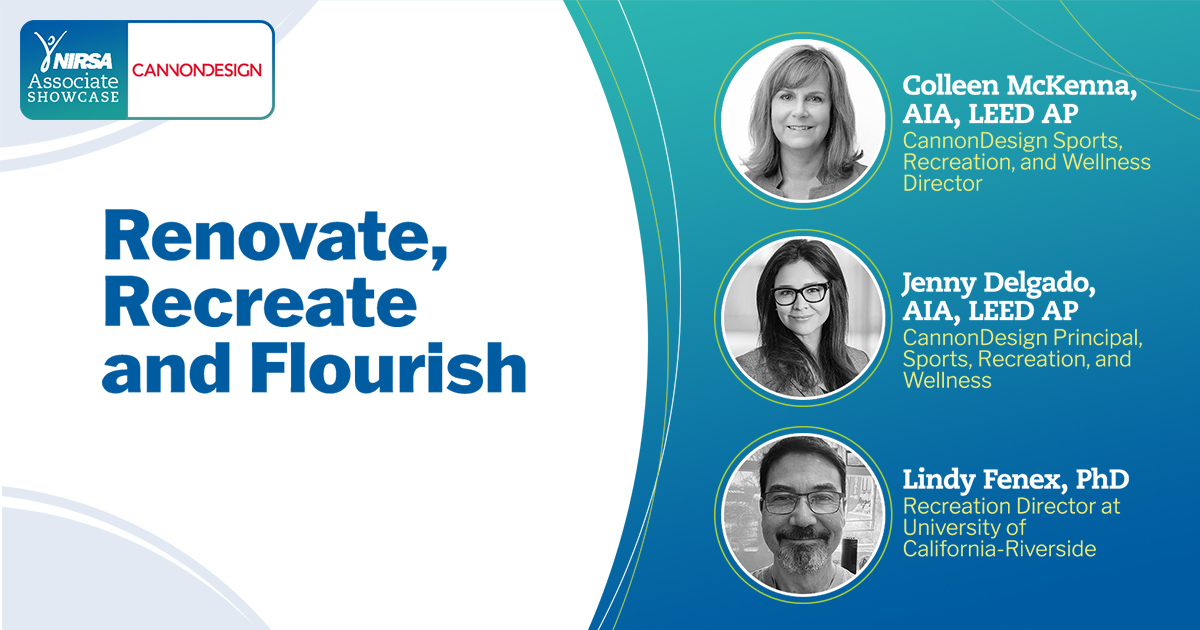By Steve Nakata, Washington State University’s Administrative Services
When Washington State University opened the doors to its Student Recreation Center (SRC) in 2001, students were in awe of the state-of-the-art $40-million facility. It quickly became the hot spot on campus. Fast forward 14 years and it’s still one of the most heavily-used buildings at WSU.
What keeps the students coming back? The opportunity to exercise and recreate is the obvious answer. But it’s more than that. The SRC provides an atmosphere that is inviting, friendly, and clean. That’s right, clean! WSU students are adamant about being able to exercise in a vibrant, healthy, and clean facility.
The SRC staff takes that sentiment to heart. Aside from the facility’s rigorous daily cleaning routine, it closes twice a year for a major scrub-down. In August and December each year, the SRC has what it affectionately calls “Closed Week”—seven straight days of mopping, dusting, shampooing, refinishing, and whatever else it takes to return the facility to its original luster.
Closed Week behind the scenes
During this week in August, SRC lifeguard Sulev Vercamer had perhaps the most difficult job. “It’s not much fun dressing up in a banana suit and having cold water spraying in your face all day,” he says. “I remember my first time, I didn’t wear waterproof boots and my feet were completely soaked all day long.”
As a pool grinder, Vercamer and his colleagues spend up to eight hours a day dressed in yellow, waterproof suits hand-grinding hard water stains from the tiles in the pool and spa area. This isn’t an ordinary spa, mind you—it includes a recirculating waterfall and seats up to 53 people. Not even the locker rooms escape the attention of the diligent crew.
 Less than a hundred yards from where Vercamer was working, Fitness Services Coordinator Matt Atwell led a team charged with moving and cleaning weight-lifting equipment. Twice a year, nearly 100 pieces of weight equipment are moved off the floor and thoroughly wiped-down. Then the floor itself is meticulously scrubbed.
Less than a hundred yards from where Vercamer was working, Fitness Services Coordinator Matt Atwell led a team charged with moving and cleaning weight-lifting equipment. Twice a year, nearly 100 pieces of weight equipment are moved off the floor and thoroughly wiped-down. Then the floor itself is meticulously scrubbed.
“Just glancing at this floor you wouldn’t think it gets very dirty,” says Atwell. “But when we’re done scrubbing it, the water looks really stinky and disgusting!” A few years ago, Matt began a tradition of keeping a jar of the putrid water as a reminder to his staff of how important it is to keep everything clean.
Just above Atwell, on the second level, Hannah Buchan was shampooing the carpet in the circuit-training space. She has also become intimately aware of how sweat, dirt, and dust can accumulate in every nook and cranny. “This is my first Closed Week and I’m just amazed at the level of care this place receives,” says Buchan, a reception supervisor. “It’s definitely a lot of work, but it’s work that makes sense and my shifts fly by.”
On the other side of the 165,000 square-foot building, Arturo Gavilanes stood at the base of the 35-foot climbing wall looking up at climbers putting back into place freshly-cleaned hand-holds—hundreds of them that mark between 60 and 80 different climbing routes. Each hold is soaked in vats of vinegar/water solution for 24 hours to dissolve the chalk build-up. What chalk doesn’t dissolve is cleaned by hand.
When the holds are removed, the crew focuses their attention on cleaning the wall itself. This is Gavilanes’ eleventh time participating in Closed Week, making him a veteran of the process. And he is always looking for an easier, more efficient way to do the job; but his ultimate goal is to preserve the integrity of the building and equipment for the WSU community: “Yesterday, we tried to gently clean the wall using a steam cleaner,” he explains. “But it produced too much heat and threatened to melt and damage the surface, so we stopped.”
Six people were focused just on the climbing wall—even dusting behind the wall—and Gavilanes said it took most of the week to complete the task.

It’s all hands on deck
With 4,000 visitors a day and more than 750,000 users last year, the SRC is always a flurry of activity. The same can be said of Closed Week, but the flurry is of a different kind.
“It’s all hands on deck for the two Closed Weeks each year,” says Jeff Elbracht, SRC facilities director and NIRSA member. “Everyone knows it’s going to be hectic, but they take pride in it and give their full effort. At the end of the week they walk around and say, ‘Look at this place sparkle!’”
In addition to the weight room, pool area, and circuit training space, some members of the SRC team were refinishing the basketball courts, racquetball courts, and multipurpose rooms. Others were washing windows, both inside and out. Even the ceiling rafters, towering more than 30-feet off the ground, received a good dusting.
The benefits of clean
Why devote so much time and effort to cleaning the recreational facility? Elbracht explains that students made a large financial investment via student fees to build the facility and it’s important to be good stewards of their investment. Health and safety are also high on the list of reasons. “The primary way to support our mission and goals is by providing clean, well-maintained facilities and equipment that help inspire people to stay active,” says Elbracht.
 Establishing a “culture of clean” has paid-off in many ways. Elbracht said keeping the facility in good shape has resulted in fewer, less-expensive repairs and happier users. Being able to show prospective students and their families a clean, top-notch recreational center also helps with enrollment.
Establishing a “culture of clean” has paid-off in many ways. Elbracht said keeping the facility in good shape has resulted in fewer, less-expensive repairs and happier users. Being able to show prospective students and their families a clean, top-notch recreational center also helps with enrollment.
“We do a lot of tours in here and many people can’t believe this building is almost 15 years old,” he says. “It’s a real tribute to our maintenance and custodial staff.”
In addition to making things sparkle, Closed Weeks provide an opportunity for the SRC staff to repair and replace aging equipment with new machines. This August, they were busy installing 14 new ellipticals, eight treadmills, one stepmill, and one rope pole. Typically, 15-25 pieces of cardio equipment are replaced every August.
Long ago, the SRC incorporated closed weeks into its annual planning—impacting everything from financial allocations, programming dates, vacation schedules, and student hiring. Elbracht said they have since become part of the SRC’s culture, noting that maintaining a healthy recreational facility falls in line with NIRSA’s strategic values of encouraging campuses to build sustainable communities and promote health and wellbeing.
There’s no doubt the work that takes place during WSU Recreation’s Closed Weeks can be deemed tedious; but everyone seems to welcome the change in routine. “How often do you get a chance to roll up your sleeves and do some dirty work with your work colleagues?” says Atwell. “I feel like I’ve gotten to know people much better because we’re all working together to clean this place.”
This fall, the SRC is expecting its 10-millionth visitor to walk through the turnstile. Because it’s such a popular place on campus, Vercamer knows more hard water stains will be waiting for him in December when the building shuts down for another Closed Week. But like the rest of his colleagues, he is already looking forward to it. It will be another opportunity to make the building glow. “Look at this place,” he says with a grin. “It still looks new!”
For more information about WSU’s Culture of Clean, please contact Steve Nakata, Director of Marketing and Communications at WSU. To learn more about having your story featured on the NIRSA website, email NIRSA Communications Coordinator Nazifa Islam.
Photos courtesy of Sarah Page, Washington State University.









